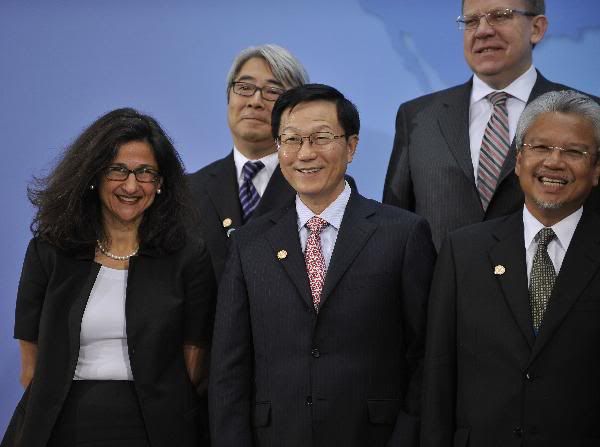
Chinese Finance Minister Xie Xuren (C, Front) and other participants pose for a group photo prior to the IMF-World Bank Development Committee meeting in Washington April 25, 2010.
The voting power reform approved by the World Bank's Development Committee on Sunday is a historic move and will let developing countries play bigger roles in world development, said Chinese Finance Minister Xie Xuren.
"This reform has increased the representation and voice of developing countries and made the World Bank's governance structure fairer and more reasonable," Xie told reporters in Washington.
"It will protect the interest of developing countries and provide developing countries chances to play a bigger role," the minister said. "It will also enhance the World Bank's contribution to helping developing countries' economic development and poverty reduction."
World Bank member countries reached an agreement on a 3.13-percent shift in voting power to give emerging and developing nations greater influence in the global institution.
The shift will increase the votes of the developing world to 47.19 percent from 44.06 percent. China's stake at the bank, in terms of voting power, rises from 2.78 percent to 4.42 percent.
Xie said the reform reflected the reality of enhanced economic power and world status of developing countries. China's voting power increase will strengthen cooperation between China and the Washington-based international lending institution.
Xie noted that the shift of voting power laid a foundation for deepening related reforms of the World Bank.
"This is the first reform which aims at enhancing voice and participation of developing and transition countries in the World Bank's history," Xie said. "It will contribute to achieving the ultimate goal of equitable voting power between developing countries and developed ones."
Xie said that the reform also had a model effect. The World Bank's reform will help promote its sister institution, the International Monetary Fund's quota reform.
In a statement, Xie said the achievement was "only part of the ongoing process," noting China supported periodic review of International Bank for Reconstruction and Development (IBRD) shareholding in future. The IBRD is the original institution of the World Bank Group and normally represents the group.
"The future shareholding principles should continue to be based on economic weight, give full consideration to developing countries' contribution to IBRD as development partners, and aim to achieve the ultimate goal of equitable voting power between developing countries and developed ones," he added.
World Bank President Robert Zoellick said at a news conference that the shift in voting power "recognizes that we need to consign outdated concepts like 'Third World' to history. Today, the world is moving toward a new, fast evolving multipolar economy."
"Today was a good day for multilateralism," said Zoellick. "This shift of shares is agreed by our shareholders. They try to recognize the change in the world economy and include the contribution to the development in the methods, which can encourage developing countries in transition."





0 comments:
Post a Comment